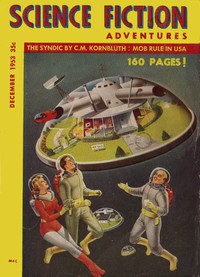The Hanging Stranger by Philip K. Dick (top 10 novels of all time txt) 📗

- Author: Philip K. Dick
Book online «The Hanging Stranger by Philip K. Dick (top 10 novels of all time txt) 📗». Author Philip K. Dick
They kept a tape recorder going all the time he talked. When he had finished the Commissioner snapped off the recorder and got to his feet. He stood for a moment, deep in thought. Finally he got out his cigarettes and lit up slowly, a frown on his beefy face.
"You don't believe me," Loyce said.
The Commissioner offered him a cigarette. Loyce pushed it impatiently away. "Suit yourself." The Commissioner moved over to the window and stood for a time looking out at the town of Oak Grove. "I believe you," he said abruptly.
Loyce sagged. "Thank God."
"So you got away." The Commissioner shook his head. "You were down in your cellar instead of at work. A freak chance. One in a million."
Loyce sipped some of the black coffee they had brought him. "I have a theory," he murmured.
"What is it?"
"About them. Who they are. They take over one area at a time. Starting at the top—the highest level of authority. Working down from there in a widening circle. When they're firmly in control they go on to the next town. They spread, slowly, very gradually. I think it's been going on for a long time."
"A long time?"
"Thousands of years. I don't think it's new."
"Why do you say that?"
"When I was a kid.... A picture they showed us in Bible League. A religious picture—an old print. The enemy gods, defeated by Jehovah. Moloch, Beelzebub, Moab, Baalin, Ashtaroth—"
"So?"
"They were all represented by figures." Loyce looked up at the Commissioner. "Beelzebub was represented as—a giant fly."
The Commissioner grunted. "An old struggle."
"They've been defeated. The Bible is an account of their defeats. They make gains—but finally they're defeated."
"Why defeated?"
"They can't get everyone. They didn't get me. And they never got the Hebrews. The Hebrews carried the message to the whole world. The realization of the danger. The two men on the bus. I think they understood. Had escaped, like I did." He clenched his fists. "I killed one of them. I made a mistake. I was afraid to take a chance."
The Commissioner nodded. "Yes, they undoubtedly had escaped, as you did. Freak accidents. But the rest of the town was firmly in control." He turned from the window. "Well, Mr. Loyce. You seem to have figured everything out."
"Not everything. The hanging man. The dead man hanging from the lamppost. I don't understand that. Why? Why did they deliberately hang him there?"
"That would seem simple." The Commissioner smiled faintly. "Bait."
Loyce stiffened. His heart stopped beating. "Bait? What do you mean?"
"To draw you out. Make you declare yourself. So they'd know who was under control—and who had escaped."
Loyce recoiled with horror. "Then they expected failures! They anticipated—" He broke off. "They were ready with a trap."
"And you showed yourself. You reacted. You made yourself known." The Commissioner abruptly moved toward the door. "Come along, Loyce. There's a lot to do. We must get moving. There's no time to waste."
Loyce started slowly to his feet, numbed. "And the man. Who was the man? I never saw him before. He wasn't a local man. He was a stranger. All muddy and dirty, his face cut, slashed—"
There was a strange look on the Commissioner's face as he answered. "Maybe," he said softly, "you'll understand that, too. Come along with me, Mr. Loyce." He held the door open, his eyes gleaming. Loyce caught a glimpse of the street in front of the police station. Policemen, a platform of some sort. A telephone pole—and a rope! "Right this way," the Commissioner said, smiling coldly.
As the sun set, the vice-president of the Oak Grove Merchants' Bank came up out of the vault, threw the heavy time locks, put on his hat and coat, and hurried outside onto the sidewalk. Only a few people were there, hurrying home to dinner.
"Good night," the guard said, locking the door after him.
"Good night," Clarence Mason murmured. He started along the street toward his car. He was tired. He had been working all day down in the vault, examining the lay-out of the safety deposit boxes to see if there was room for another tier. He was glad to be finished.
At the corner he halted. The street lights had not yet come on. The street was dim. Everything was vague. He looked around—and froze.
From the telephone pole in front of the police station, something large and shapeless hung. It moved a little with the wind.
What the hell was it?
Mason approached it warily. He wanted to get home. He was tired and hungry. He thought of his wife, his kids, a hot meal on the dinner table. But there was something about the dark bundle, something ominous and ugly. The light was bad; he couldn't tell what it was. Yet it drew him on, made him move closer for a better look. The shapeless thing made him uneasy. He was frightened by it. Frightened—and fascinated.
And the strange part was that nobody else seemed to notice it.
End of the Project Gutenberg EBook of The Hanging Stranger, by Philip K. Dick




Comments (0)